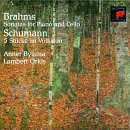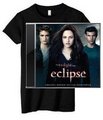Summit of "Authentic" Romantic Playing
stradgirl | Toronto, ON | 02/20/2002
(5 out of 5 stars)
"It may be hard for some to imagine that a performer, whose mastery of baroque performance has established him as one of the most respected "authentic" interpreters, could play Romantic music just as masterfully--some may wonder, Brahms and Schumann without vibrato? Amazingly, Bylsma does use quite a liberal amount of vibrato on this recording--tantalizingly tastefully, too. From beginning to end, there is an ever-continuing fullness of resonance; his musical lines possess a sense of complete assurance and naturalness, as if propelled by a natural force behind the music, without sounding as though the music passes by too easily and does not leave much impression. Each phrase is beautifully texturized, and the coherence as a whole is simply enlightening--or "lightning": suddenly the whole piece makes sense to you. Especially, Bylsma captures the melancholy, ponderousness and quirkiness of Schumann impeccably: you could not possibly ask for more. Yo-Yo Ma's early recording is no rival to this performance, and Rostropovich's Schumann recoring which is coupled with Arpeggione Sonata, is not quite as musically compelling. I would really like to say that there is simply no better intepretation, even acknowledging the explicitness of such a statement. This recording truly has everything a listener desires, from transcendingly unwiding moments to intense vitality, from an affable, quirky sense of humour to masculine seriousness and aching sentiments. I believe that it is an album to be loved universally, by listeners of every taste and every preference--and quite positively indeed."
Wayward, personal interpretations unlike anything you'll lik
John Grabowski | USA | 07/30/2008
(5 out of 5 stars)
"Imagine...you're walking down the hallway of some university or music school and you come across two faculty members playing Brahms or Schumann chamber music, for their own enjoyment. They aren't performing for the galleys, they're just speaking to each other, and you, standing off to the side of the door, are listening to that conversation. They are worried about communicating with each other at a distance of two feet, and not with people in row 33. That's what this CD is like. These are not the most flamboyant or romantic readings you're going to hear, so if you're looking for the fireworks of a Rostropovich or the drama of an Argerich--not that there's anything wrong with that--look elsewhere. But if you want to hear two musicians communicating very earnestly to each other, having fun with each other's company, this is a CD to get and put on late at night, as you sit by a fire and relax with a bourbon. (Or a Mr. Pibb if that is your pleasure.) It reminds you that this is *chamber* music, and that chamber music didn't become of the histrionic type until works such as the Franck F minor Quintet curled hairs on the backs of necks some time later.
These are period instrument performances, but honestly there's not a ton of difference. The cello is rounder and more mellow, warmer and more like a human voice. The piano doesn't have the sharp upper register or the dynamic range (or at least, Orkis doesn't play it that way) that you hear in modern instrument readings. The two instruments are more as one, partners rather than adversaries. This really comes across in the Brahms, and especially in the Adagio Affetuoso in the second Brahms sonata. I have no idea what the performance relationship is between Mr. Orkis and Mr. Bylsma--for all I know they met for the first time ten minutes before they came into the studio--but it sounds here like they've been musical partners of the closest kind for decades. Again, picture two college professors in their study, playing for themselves, not even aware anyone else is listening.
It's also interesting to note how different Orkis is here than when he accompanies Anne Sophie Mutter. Previously I'd only heard him in that setting, and honestly was never that impressed. Dutiful but anonymous is how I'd generally describe him. At the same time, I have a friend who said he felt Mutter was never much of a chamber performer, because give-and-take was not her strength and she had to have the spotlight on her to shine. Perhaps he is correct, for without her glow (glare?) Orkis shines here as a low-key and sometimes perhaps too deferential, but intelligent partner. I'm not saying he's a Cortot or a Rubinstein, but there's more to him than you hear in his ASM collaborations. As Leslie Gerber observes, these are not the most exciting or lively realizations on disc, and for some I could understand how this recording might disappoint, but if you're a little adventurous and mustn't have your chamber music with big swells and hair-tossing moments, you just might want to explore this disc. I wouldn't always want to approach these works this way, but this is a nice, fresh offering.
"


 Track Listings (12) - Disc #1
Track Listings (12) - Disc #1
